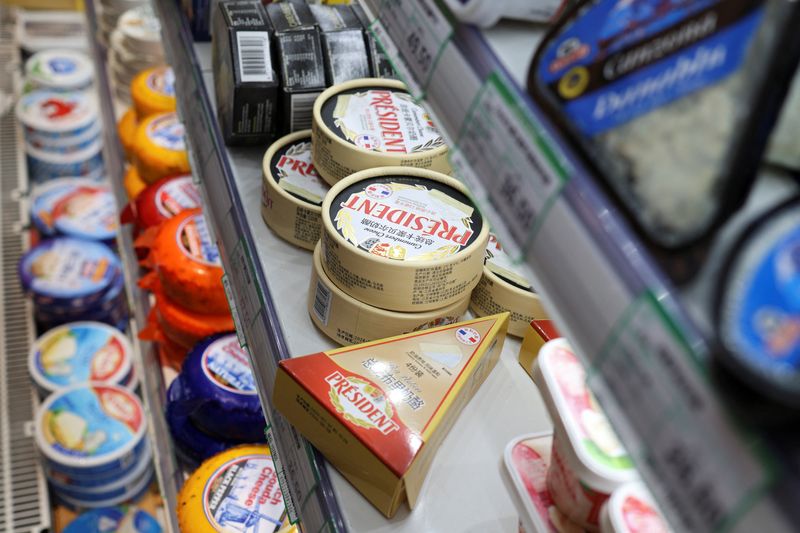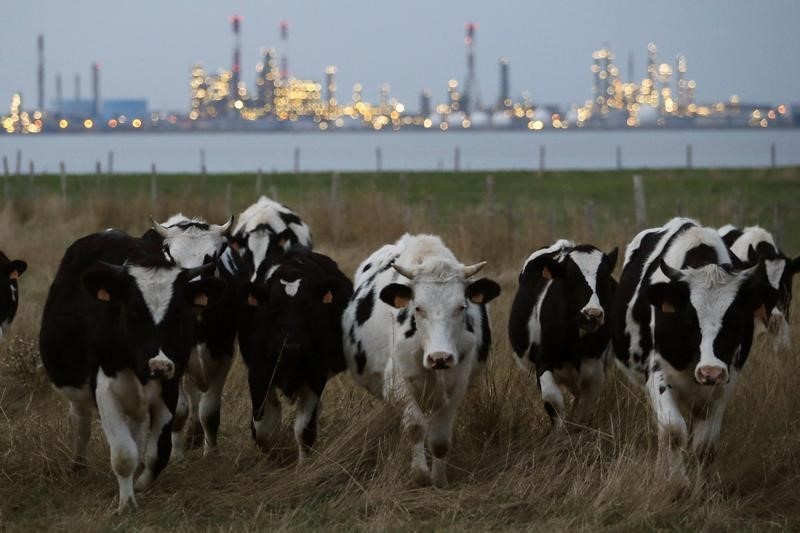BEIJING/LONDON (Reuters) -China has launched an anti-subsidy investigation into dairy imports from the European Union a day after the bloc’s revised tariff plan for Chinese-made electric vehicles.
Wednesday’s investigation into cheese, milk and cream intended for human consumption came after the EU changed proposed punitive duties on Chinese EV imports from 37.6% to 36.3%. Beijing had urged Brussels to scrap the tariffs.
CHAMBER OF COMMERCE OF THE EUROPEAN UNION IN CHINA:
“Unfortunately, there is increasingly a seemingly similar response to the recipient government’s use of trade defense instruments.
“Therefore, in light of the European Commission announcing the final findings of its investigation into electric cars from China, China’s decision to launch an anti-subsidy investigation should not be considered a surprise.
“The House will monitor the investigation and hopes that it will be conducted fairly and transparently. We expect our involved affiliated companies to fully cooperate with the investigation.”
FRIESLANDCAMPINA:
The Dutch dairy cooperative FrieslandCampina says it is aware of the announcement of the anti-subsidy investigation by the Chinese Ministry of Commerce.
“We will of course provide the necessary information in connection with the investigation if requested, in accordance with laws and regulations,” a spokesperson said.
The company’s specialty nutrition business sells infant nutrition products in China. FrieslandCampina also has a small company that sells condensed milk products and creamers for the business-to-business market.
THE IRISH FARMER’S ASSOCIATION:
Tadhg Buckley, policy director and chief economist at The Irish Farmers’ Association, the country’s largest agricultural lobby group, said Chinese authorities are mainly looking at “cheese, cream and other related processed cheeses, blue cheeses and those types of cheeses”.
He said this would represent about 45 million of the 430 million euros ($478.55 million) in Irish exports last year, with specialty powders used for food purposes making up the bulk of exports to China.
“If the investigation continues as it stands, it will involve a product worth €45 million, but if it were to expand outwards to powders it would certainly be a very different and much more important issue for Ireland “, he said, adding that a trade The delegation left for China at the end of this month.
IRISH MINISTRY OF AGRICULTURE, FOOD AND MARINE:
“I will work with the European Commission to ensure it has all the data necessary to resolve any issues raised in the proposed research,” said Charlie McConalogue, Ireland’s Minister for Agriculture, Food and the Marine . said.
“In this respect, I am confident that European and Irish dairy exports are fully compliant with World Trade Organization rules.”
JACOB GUNTER, LEADING ECONOMY ANALYST AT MERCATOR INSTITUTE FOR CHINA STUDIES:
“In total, total EU dairy exports to China amount to approximately 1.7 billion euros, which is less than 1% of total EU exports to China. So even if tariffs become so high that they de facto block all dairy trade, there will be a relatively small impact on EU exports.
“Nevertheless, the pain will be felt more acutely by the biggest exporters to China, from Irish butter to Finnish milk powder, from Spanish Manchego to Italian Parmigiano Reggiano.
“China has been increasing its own dairy production for years and only a small portion of all dairy products consumed in China are imported.
“China is important for butter and cheese exports, but given the size of the country it is still a small player.
“I expect more ‘substitutable’ dairy products will be most affected by tariff increases as alternatives from the US, Canada, Australia and New Zealand will be more cost competitive – think butter, milk, milk powder, cream and the most common types of cheese .

“For less ‘substitutable’ product types – for example many of Europe’s high-end and specialist cheeses – the key question will be at what point a particular product simply becomes unaffordable.”
($1 = 0.8986 euros)


